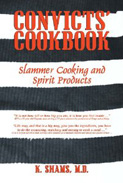"The number of offenses carried out while under the influence of drugs and alcohol is staggering."

 |
Convicts' Cookbook: Slammer Cooking and Spirit Products by K. Shams, M.D. Trent's Prints & Publishing
book review by Mihir Shah
Applying his neuropsychiatric background and consulting experience for the Florida Department of Corrections, Shams examines the dilemma of using prisons to trap offenders who exhibit obvious signs of mental illness. Convicts' Cookbook is unlike any other book: On the surface, it is essentially a collection of prisoner profiles and their favorite recipes; however, when one digs deeper, each prisoner's narrative becomes apparent.
The author does not condone the crimes that these individuals have committed. On the contrary, he argues that only ten percent of the prison population is serving time for hard crimes such as murder or sexual molestation. Shams' bottom line is simple: An astounding number of individuals in prison require—and don't receive—mental illness or substance abuse treatment. Rather than undergoing rehabilitation, the criminals learn negative habits from each other, only accentuating their grim circumstances.
The criminal justice system invests $38,000 per year per prisoner, yet they don't emphasize an individual's redeeming qualities and don't present an environment where the delinquent can improve and return to society. Shams brilliantly weaves the reflections of the incarcerated with their preferred recipes to shed light on society's forgotten, all of whom have made serious mistakes, but many who still deserve the opportunity for redemption and a return to normalcy. Shams asks the prisoners six basic, open-ended questions revolving around why they are in prison, their thoughts on life's purpose, belief in heaven and hell, and their perceived problems with the world, the United States, and themselves.
Each individual's story is represented in two pages: the left side consists of the interview and a self-portrait, while the right side consists of their ideal dish, often inspired by their predicament. LA's Die in Dreams drink, RL's Dirt Poor Soup, and Slammer Birthday Cake, to name a few, are typical titles. Interestingly, many of the recipes are oversimplified, representing the limited resources available to the convicts.
The cookbook's sympathetic tone toward some of the miscreants is reinforced by the unprecedented number of crimes committed under the influence of drugs, particularly by those with scarred family histories. A harrowing example from JD highlights this dysfunction: "I was on Ritalin as a child and grew up in state boarding homes after my dad shot my mom and cut her up. He then shot himself, but didn't die." These stories, though not vindicating, are far too common in the criminal justice system, and emphasize the need to think about early intervention. What is triggering these unhealthy, detrimental behaviors? How can society's support system target these individuals to provide proactive rather than reactive treatment?
Readers will find many highly intelligent and thought-provoking responses in this cookbook. When asked what was the matter with the country, one man responded, "No freedom. We are all in prison, some there, some here. Prisoners of work, debt, credit cards, sick relations, in and out of prison." The majority of interviewees acknowledge that corruption, greed, and the legal system are the driving forces behind the world's major issues.
While Convicts' Cookbook is unique in book format, it is an extension and elaboration of many prominent articles written to challenge and educate readers on the topic of substance abuse treatment for prisoners. Similar to Shams's hands-on experience with the mentally ill in the prison, Jenn Ackerman conducts a project, Trapped, at the Kentucky State Reformatory where she observes prisoners throwing feces at each other, hitting themselves to the point of bleeding, and exhibiting the most primal of human emotions: tears. Hope has been extinguished among this demographic and hardly anyone seems to acknowledge their existence. Individuals like Shams and Ackerman seek to ignite sweeping changes in the treatment of the mentally ill prisoner. Average prison time is 3.5 years; what becomes of these individuals when they are released back into society? In a New York Times article published on April 10, 2013, states that thirty percent of the 33,000 prison population suffer from mental illness.
Ultimately, the country needs to identify a better mode of treatment for the mentally ill prisoner. Not only will this contribute to a healthier society, but it will also be beneficial financially for taxpayers who support the prisons. M. Shams allows the reader to enter into a forgotten world and into the minds of a forgotten people. Convicts' Cookbook is a highly educational must-read with the potential to spearhead change in society.
RECOMMENDED by the US Review